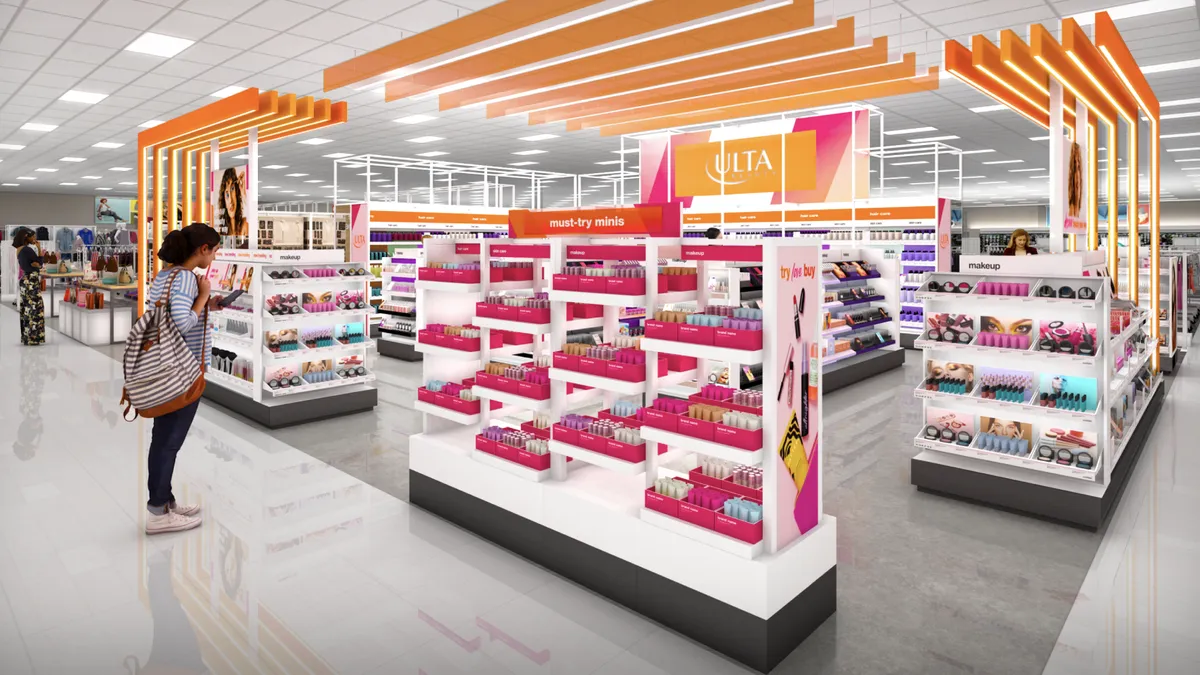Dive Brief:
- While other retailers’ sales fell this quarter as they lapped a particularly strong year in 2021, Ulta posted another record quarter thanks to strong customer demand and double-digit comps growth across every major category.
- Net sales in Q1 rose 21% to $2.3 billion, up from $1.9 billion the prior year, on the back of fewer COVID restrictions. Comps grew 18% and net income increased by about $100 million, reaching $331 million, according to a company press release.
- Ulta opened 26 Target shop-in-shops in the quarter, expanding that footprint to 127 total locations, Ulta's Chief Executive Officer Dave Kimbell said on a call with analysts Thursday. Target’s high traffic is helping the retailer introduce itself and its rewards program to new shoppers.
Dive Insight:
Both Target and Ulta seem to be thrilled with the early results of their shop-in-shop deal. The pair have already exceeded the initial 100-store plan, with Ulta this year announcing the retailers would open an additional 250 shop-in-shops.
Target CEO Brian Cornell said earlier this month that the partnership has exceeded expectations and is driving higher productivity and sales in the beauty area and surrounding categories. On the call Thursday, Ulta's Chief Operating Officer Kecia Steelman likewise said the partnership is going well, with the beauty retailer planning to integrate more of its marketing with Target for key events. Kimbell highlighted the retailer’s 21 Days of Beauty event as one example, in which Ulta co-created digital and in-store communication with Target to drive higher engagement.
As the shop-in-shops open, there has been some “natural cannibalization,” according to Steelman, but it is “not meaningful yet.”
“Whenever we’ve opened or there's other points of distribution, including our own Ulta Beauty stores, we do see an initial impact but that dissipates over time and we expect a similar pattern to happen here with our Ulta Beauty at Target locations,” Steelman said.
While Ulta is feeling the same pressure as other retailers in the space when it comes to higher supply chain costs, Kimbell said that inflation so far doesn’t seem to be impacting its shoppers. In fact, prestige cosmetic sales in the quarter outperformed mass cosmetics. However, the retailer is prepared to pivot its assortment to favor lower-priced products if needed.
“One of the unique things that we feel is core to our model is the breadth of our assortment — all price points, from mass to prestige; all categories, hair care and skin care, makeup and bath and fragrance — and so being able to adjust and adapt as consumers' needs evolve has been true to our model for a long time and allowed us to manage through any disruption in the marketplace,” Kimbell said. “But right now, we're seeing strength across all aspects of our business, which we're obviously really pleased with.”
















